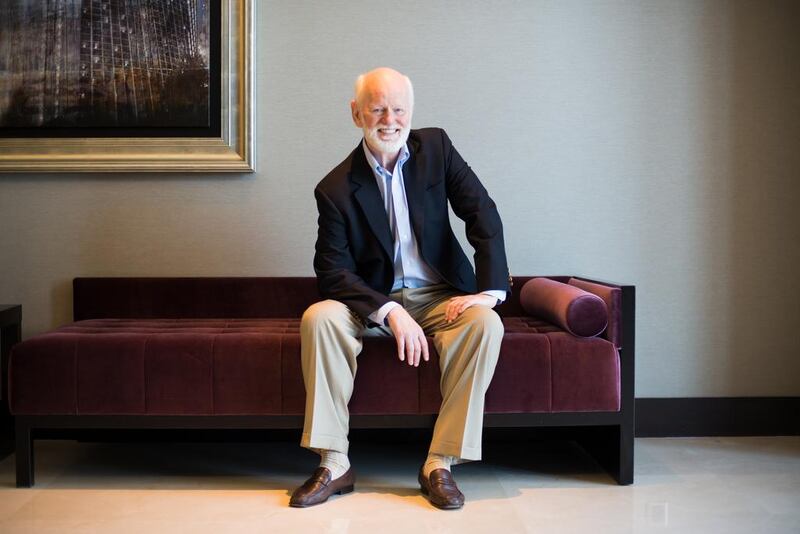Every night for the past 27 years, Marshall Goldsmith has performed the same ritual before going to sleep. He has a friend call him and ask 22 “active questions”, to check he has lived his life that day in the best way possible.
The questions all measure effort rather than results, starting with the phrase “Did you do your best to…s?”. The 66-year-old American business coach from Kentucky encourages the leaders he works with to do the same.
The author of 35 books, which have sold more than two million copies, was in Dubai this month to launch his latest tome: Triggers: Creating Behaviour That Lasts, Becoming the Person You Want to be, co-authored with Mark Reiter. First released in July, it quickly became The New York Times' bestselling business book.
It explains how certain “triggers” influence our behaviour. For Mr Goldsmith, his own regime of self-scrutiny is his trigger to help him recognise when he is falling short of his own expectations.
“We need to do more of creating our own triggers, as opposed to just becoming the person that triggers in the environment are making us become,” he says.
People today are barraged by relentless external triggers and tend to be chronically overcommitted, warns Mr Goldsmith.
“Emails, voicemails … if we’re not careful, we’re just buffeted from thing to thing and go through the day with little consciousness of anything,” he explains. “It’s hard to get people to focus on long-term investments when they’re buried with short-term requirements.”
Mr Goldsmith says many people today have a recurring dream where the pressures of work follow them everywhere. During the dream they will “feel overcommitted” but convince themselves that because they are working on a special project, the worst will be over soon.
But the business coach doubts that sanity will ever prevail for these dreamers.
“Tomorrow is probably going to be crazier than today,” he says. “Learn to face the fact that you’re always going to be incredibly busy and focus on what you can do today. I do my daily questions to test myself on what I do every day, as opposed to always thinking: ‘I’ll get to it in a few weeks.’”
Instead Mr Goldsmith believes we must all take responsibility for our own lives – particularly when it comes to jobs.
A 2013 Gallup study on the state of the global workplace found that only 13 per cent of employees around the world are engaged at work and 24 per cent are actively disengaged. “In spite of everything that’s been done by companies, employee engagement is at an all-time low,” says Mr Goldsmith.
“I was on an American Airlines flight recently. One air hostess was upbeat and enthusiastic, one was bitter and cynical. Same plane, same pay, same employee engagement programme. People who are miserable at work are miserable at home, they’re just miserable people. The key variable in the engagement equation is the person.”
Instead of rolling out programmes which statistically do no good, Mr Goldsmith says companies should train employees to measure their own goals.
In an attempt to increase employee engagement, the author conducted a study of more than 2,500 people. During the research period, the respondents were tested daily on six “active” questions, such as: “did you do your best to set clear goals?”, rather than ‘do you have clear goals’, and “did you do your best to be happy?” rather than “were you happy?”
“This gets you to focus on what you can do as opposed to what you can’t”, says Mr Goldsmith.
After two weeks, 37 per cent of respondents said they were better at everything, and 65 per cent said they had improved on four out of the six questions.
For those looking to motivate themselves, Mr Goldsmith advises formulating your own six questions. “Each one should have four qualities – you write the question, you know the answer, you know it’s important and all you ever do is try.”
He claims that asking yourself six questions only takes two minutes a day, and will help you improve almost anything you need to at work. “But at least half of people quit within two weeks – not because it doesn’t work, but because it does work.”
After 27 years of rigorous self-questioning, Mr Goldsmith says he still rarely achieves a perfect score in his own testing, with one question always bringing the result down – what percentage of the day am I conscious of what was going on around me?
“All of us have times when our ‘monkey mind’ takes over, when your mind jumps from place to place with very little consciousness about what you’re doing and why you’re doing it,” he adds. “The internet is the amphetamines for the monkey mind.”
business@thenational.ae
Follow The National's Business section on Twitter





